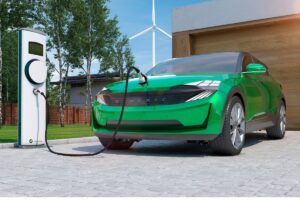Writer: Ryan Gandolfo

2 min read June 2022 — Orlando is becoming a hub for electric mobility, with a key focus on bringing more electric vehicles (EVs) into the area.
The City of Orlando recently rolled out its 2030 Electric Mobility Roadmap, which sets targets on EV adoption and charging stations, among other initiatives.
“We have been one of the electrification leaders in the southeast. Last year, we placed 100 additional charging stations in public parks, neighborhood centers and other areas, so we anticipate that we will be able to lead the electric vehicle segment in the near future,” Orlando Mayor Buddy Dyer told Invest:.
Consumer interest in electric vehicles is relatively lower in the U.S. compared to other countries around the world. EY’s Mobility Consumer Index 2022 study, published in May, showed 29% of U.S. consumers were interested in purchasing an EV, compared to 63% in South Korea and 73% in Italy.
But stakeholders in Orlando envision EVs and other electric mobility options as the future of transportation in the sunshine state.
The Central Florida Expressway Authority is currently working on the Lake Orange Connector, a toll road between US-27 and FL-429, which will include cables underneath the road to fuel EVs. “The road is being fast-tracked and will include technology to charge electric vehicles while they travel. We are very excited about having this advanced technology available in Lake County,” Tracy Garcia, executive director of Elevate Lake Economic Development, told Invest:.
Drivers are still weary of the accessibility to charging stations, a critical component when considering purchasing an electric car. According to a nationwide survey, 48% of respondents said that the lack of public charging stations held them back from buying an EV, as cited by the city roadmap.
The Orlando Utilities Commission’s Robinson Recharge Mobility Hub is one project looking to address the lack of charging stations. The Hub, which is on track to open in Dec. 2022, will have 20 EV high-speed charging dispensers operational by the summer of 2023.
The station will be located on Robinson Street, located between I-4 and the SunRail train tracks, and it’s one of six stations that the OUC is looking to build by 2025 to encourage EV ownership and reduce CO2 emissions.
With higher gas prices draining drivers’ bank accounts in Orlando and around the country, we can expect to see interest grow for EVs. According to the city roadmap, charging an electric vehicle in Florida costs only $1.08 per ‘e-gallon,’ a significant improvement over gas prices in Lake and Orange counties, averaging $4.87, as cited by AAA.
Despite the higher upfront cost of EVs compared to conventional cars, car prices are expected to drop over the next decade to more affordable levels. A cost-benefit analysis on electric vehicles in Florida estimates that a high level of EV adoption would save $84.5 billion cumulatively by 2050 in vehicle operating costs, according to a 2019 report by strategic consulting firm MJB&A.
Orlando presents a unique opportunity for the EV market as households in the city spend roughly double their income on transportation (23%) compared to markets like Boston (12%) and New York City (9%). With more charging-enabled roads built and public charging stations accessible in the city, residents should be more enticed by purchasing EVs.
As of May 2022, Tesla accounted for roughly 60% of the 12,534 EVs registered in Orange, Lake, Seminole and Osceola counties, according to online platform Atlas EV Hub.
But more electric vehicle models are becoming available in the US market, with over 100 models expected by 2024.
From the increase in EV options in the private sector to strategic electric mobility projects throughout the city, Orlando’s future is electric.
“We are excited about the future, and we recognize the importance of making investments in transportation and infrastructure in the city,” said Mayor Dyer.
For more information, visit:

